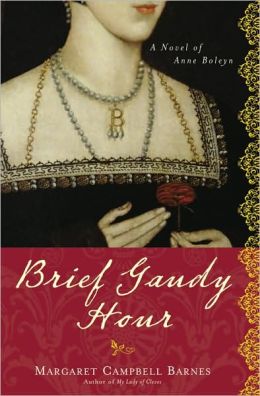Hello Historical Fictionettes,
Thank you for stopping by, today I am reviewing a book by Margaret Campbell Barnes.
Book Title: Brief Gaudy Hour: A Novel of Anne Boleyn
Author: Margaret Campbell Barnes
Year Published: 1949
Pages: 378 pages (Not including extras such as Reading Guides etc.)
Rating: 3 Crowns. A nice read.
 Synopsis: "The infamous love of King Henry VIII and the mother of Queen Elizabeth I, Anne Boleyn undertook a rocky journey from innocent courtier to powerful Queen of England. A meticulous researcher, Margaret Campbell Barnes immerses readers in this intrigue and in the lush, glittery world of the Tudor Court. The beauty and charms of Anne Boleyn bewitched the most powerful man in the world, King Henry VIII, but her resourcefulness and cleverness were not enough to stop the malice of her enemies. Her swift rise to power quickly became her own undoing.
Synopsis: "The infamous love of King Henry VIII and the mother of Queen Elizabeth I, Anne Boleyn undertook a rocky journey from innocent courtier to powerful Queen of England. A meticulous researcher, Margaret Campbell Barnes immerses readers in this intrigue and in the lush, glittery world of the Tudor Court. The beauty and charms of Anne Boleyn bewitched the most powerful man in the world, King Henry VIII, but her resourcefulness and cleverness were not enough to stop the malice of her enemies. Her swift rise to power quickly became her own undoing.
The author brings to light Boleyn's humanity and courage, giving an intimate look at a young woman struggling to find her own way in a world dominated by men and adversaries."
Review:
One of the reasons I enjoyed this book was it took the time to take us through each part of Anne's life.
We see glimpses of her life beginning with her preparation for leaving to France all the way until the executioners sword falls. We see her leaving her home, her striving to climb higher, falling in love for the first time, losing that love, setting off on a quest for revenge, manipulating a king to give her what she wants, becoming a queen, and finally, losing everything she has because she cannot fulfill the requirement of providing a heir.
We see her as more than just a scheming woman. We see her as a victim, a tragic heroine whose life ended too soon. Her humanity and courage is shown throughout this book, a woman who successfully rose from humble beginnings to the throne of England, despite living in a world dominated by men. A woman who fought against the social norm, because she longed for a life that didn't end with marriage.
I rated this book Three Crowns because:
Ms. Campbell Barnes is an eloquent writer. She describes scenes quite vividly and satisfactorily. Every scene comes to life.
However, there are a few negative traits of this book.
For one, the dates are quite jumbled.
Anne is said to be sixteen when she meets Henry Percy. That would mean her birth year was 1507. But later on in the book she is said to be thirty-three in 1536, that would indicate a 1503 birth year.
It
was published in 1949, which could account for the problem. It had very dated information, which many studies have now proven false.
She did not, as written, have a mole on her neck and that dreaded sixth finger on her right hand. Henry Fitzroy is older than Princess Mary Tudor in this book which is not true. He was actually three years younger than Mary. Henry Tudor didn't stray from Catherine of Aragon very much until he was sure that she wasn't going to give him a male heir.
But, it is quite easy to forgive the author. As I said earlier the misconceptions were probably not her fault. At least not most of them. In 1949 most of these myths were accepted as true stories, so you can hardly blame the author for believing them as well.
Most people who aren't overly-concerned with the dates and few miscalculations would have no problem with this book. Truly it's only problem is the few historical inaccuracies.
Margaret Campbell Barnes is truly a great author. I will be reviewing more of her books in the future.
Until next time Fictionettes,







